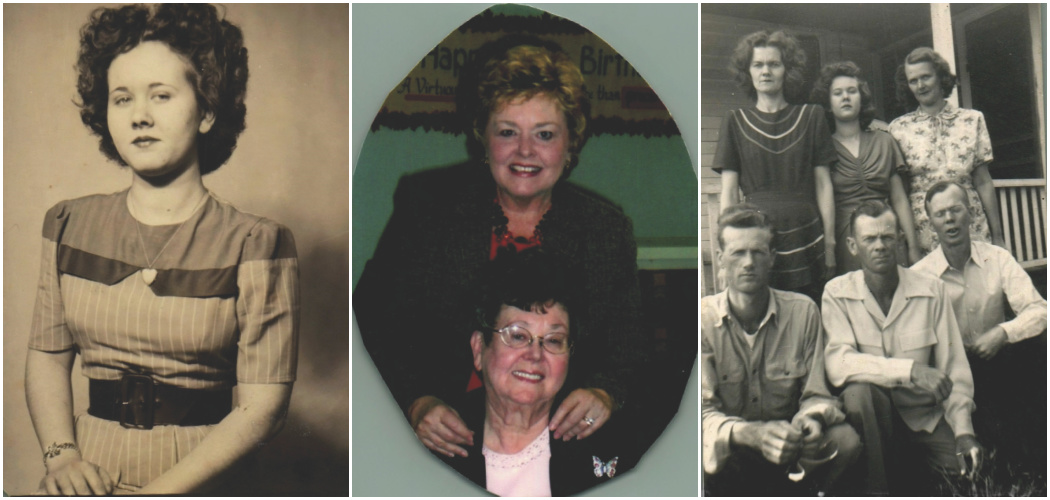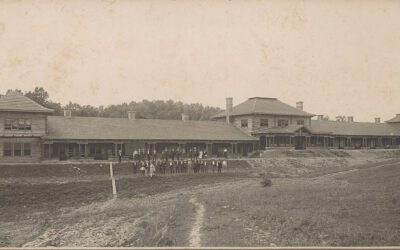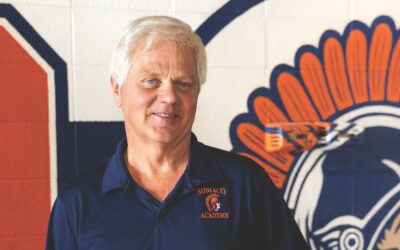[title subtitle=”WORDS and IMAGES courtesy Dorothy Johnson”][/title]
Dorothy Johnson currently resides in Fort Smith, Arkansas. Recently, Dorothy shared stories from her life to pass on to her family and friends. As Dorothy spoke, Kara Billingsley, a member of Dorothy’s church family at Assembly of God in Barling, wrote what Dorothy said, word for word. What follows us Dorothy’s story, and we are so thankful she chose to share it with us.
I was born August 1, 1928, to a tobacco farmer and his wife in the hill country of western Kentucky. I was the last of seven children. Two brothers and one sister were already away from home when I came along. There was one brother born before me who died at a very young age. As you can see, I was a child during the Great Depression. We were never hungry, but I believe some of our neighbors were. One day I went home with a school friend from recess. For lunch, we had a large jar of canned tomatoes and cornbread. Still, we laughed, ate, and had fun. They had ten children and their daddy had run away to parts unknown. In those days, no one went after him to bring him back for child support. When I was older, I loved to go to her house because there was no supervision and we really had fun!
My dad and mother came from different backgrounds and had different personalities. My dad was a strict disciplinarian while my mother loved to laugh, have fun, and was very easy to get along with. We had two big black mules, a cow, pigs, chickens, two dogs and several cats. I was a little afraid of the mules because they were so big. The dogs belonged to my brother, so being almost an only child, I made friends with the chickens and cats. In the mornings, I got up and raced to the barn very early to see if the kittens had opened their eyes or started to purr. I think to me; this is like what the kids do today when they play games on the television. I learned to read very early and searched out every book in the old house. I think I learned to read so early because when my brother was forced to read to me, he would say “Oh my aching back!” However, I did develop a love for books that has lasted a lifetime.
We lived in a big white house on top of a rocky hill which led down to a gravel road. At the end of the lane, there was a mailbox. Each day, a rural mail carrier brought the mail. I remember when he came in a buggy. Later, he came in a car. The mail was of great interest to us every day, even if it was only sales papers. Later, when I got to be in my teens, my daddy and I chased each other every day to see who got to the mailbox first. I often got letters from fellows in the service and daddy wanted to intercept them before I did! The gravel road from our house led down to what we called “the bottom.” There was a river, and when it rained, we were shut off from the rest of the world for a while. On pleasant days, we could hear voices down at “the bottom,” especially on Sundays. Then we knew company was coming for an unannounced Sunday dinner. So, we would kill a chicken and put in a few more vegetables. After dinner, we would go to the little white church for preaching. After coming home, the older men would sit on the porch and argue over what the preacher said.
I was five years old before I saw my first car. It was Thanksgiving, and relatives had come from the city to visit. They owned a car and we decided to go visit my aunt who lived a few miles away. It had snowed and it was very slick. My young cousin was driving, and my mother said, “Do you think he can drive?” Sure enough, he ran off into the ditch and we walked the rest of the way.
I walked a mile to a one room school. There were no other children in the houses on the way to school. My brother told me there were “racer snakes” in the bushes. He said the racer snakes would come out of the bushes and chase me all the way to school. So, I walked in fear. When I got to school, it was a lot of fun. At recess, we sat in the grass and ate from our tin lunch pails. Our teacher was what they called an old maid in those days. She was a great teacher and ate lunch with us. As we ate, some kids only had peanut butter and crackers in their tin lunch pails. I had individual pies my sister made me, butterscotch, vanilla, and chocolate.
Our country was tobacco country. The men worked all summer as large green tobacco plants grew. In the fall, they were harvested and hung in the barns. When ready, they were taken down and placed on a large truck which took them to the city where they were sold to tobacco manufacturers. The market was usually close to Christmas time. Oh, were the farmers and their families overjoyed with the money they received! They would pay the debt of the grocery bill that had accumulated over the year and still had some left to enjoy.
When I became a teenager, my brother gave me twenty dollars for Christmas. I went to town and bought a new dress and presents for everyone in the family. Yes, we did wash up with a wash pan and we took a bath on Saturday nights in the wash tub. Still, we kept pretty clean. We drank water from a dipper and bucket drawn from the well in the yard. My mother washed it often, especially if a gentleman came with a mustache.
In the early summer, my sister and I would go blackberry picking. We would put on boots and heavy pants. We picked the wild blackberries and later they were cooked in a very hot kitchen heated by a coal stove. They were made into jellies to eat at breakfast on hot biscuits or canned to make blackberry cobbler for dinner. None of this was easy, but it sure did taste good on winter days.
When autumn came and the trees were red and gold and all the bushes were aflame with color, my mother, my sister, and I would make our way down a path to the field, as the water was low at home. There, we would wash the household supply of quilts, making a fire under a black kettle. Once the quilts were washed, my sister and I would wring them dry, one of us on each end. We would laugh and laugh. We would then hang them on a fence that belonged to a neighbor while the cows looked on. The cows never bothered the quilts. The next day, we would come and gather the dry quilts, ready for the use of the household. Oh, did they ever smell good! Just like the clothes we hung on the line on wash day. That smell has never been equaled by fabric softener or dryer sheets!
In the summer it seemed like storms came up often, or maybe we noticed it more. We had a storm cellar dug into the ground just below our house. We kept jars of vegetables and jellies in the cellar. Snakes got into the cracks of the cellar and sometimes even got into the empty fruit jars. When it thundered, my mother was afraid and she would call “Get up girls, we are going to the cellar!” My father was not afraid, but still my mother would call him. He would say “Leave me alone and let me sleep!” My sister would lay down on a quilt in the cellar, but I stayed up and watched for snakes!
There was not much social life in the country in those days. In summers, there would be ice cream dinners and pie suppers. Ice cream dinners meant they would sell ice cream in cones. Pie suppers meant the girls would decorate baskets with crepe paper and put the pies they made inside. They were sold and the boys tried to find the basket that belonged to their best girlfriend. The older people talked and gossiped together while the kids jumped rope and played. The young people paired off together with someone who might later become a boyfriend or girlfriend.
It seemed very cold in wintertime. Only one room was heated in our house by a large fireplace. The room my sister and I slept in had no heat, but our mother heated irons in the fireplace and put them in our beds and we had heavy quilts, so we survived. When it snowed, we were really happy, as we made what we called “snow cream” with sugar, milk and vanilla. This was a real treat for us!
I had a pretty easy life until my sister left home. Being the baby, they allowed me to sleep longer than all the others who got up early. Every morning, there was a clean starched dress at the foot of the bed for me to put on. In the summers, I didn’t wear a lot more, and no shoes. After eating a biscuit and bacon, I would run out to play all day. I was thirteen when my sister took a job in the city. By that time, my mother had become sick and was not able to do any housework. So, there were meals to cook and somehow dust got in the house in the country, and it had to be swept with a broom and dusted every day. What I recall being very hard was rubbing the overalls and thermal underwear that were worn by the men in the winter on a washboard. A good thing I remember about wash day was that my mother cooked, and never did beans and cornbread taste so good as they did that day!
I still found time in the afternoons to sit in the swing and look out over the hills and dream of prince charming coming to carry me away. When he finally came, he was in an old beat-up green car wearing an old army uniform, because he was just out of the army. I was eighteen years old when this happened, and I had not had much of a dating life because my daddy believed that dating meant sitting on the couch in the parlor. Well, this was the 1940’s, men had cars then and were not interested in sitting on the couch. This prince charming was willing to sit on the couch! So, we courted and then got married in the little white church on Sunday after preaching.
One year later, we had a baby girl, and in the hospital the doctor said, “She must be a bottle baby”. Well, there was not such things in the country in those days. It was hot in the summer, and we had no refrigerator or icebox. To solve our problem, there was a well in our yard and we drew up the cold water every hour and we set bottles in pans of cold water from the well. So, she grew and prospered.
That fall we moved to the city, and I never lived in the country again. Today, I am a ninety-two-year-old great-grandmother. My prince charming has been gone for fifteen years. I live with my daughter, and I look out my window at paved streets and trimmed grassy lawns. Still, as I sit in my rocker, I can close my eyes and I can almost see the sites of the country, smell the smells, and see the beautiful dawns and the sunsets. The awaiting of things in spring and the beautiful colors of fall. Would I want to go back to the inconveniences of the country where I grew up? No, but never will I forget the sights and smells of the country, as no one who grew up there could.
A few years ago, my brother and sister-in-law graciously took me back to see the country once again. The gravel road was paved, still we walked up the same rocky hill. The house was gone; it had burned down. The big trees that stood in the yard were gone. The hundred-acre farm was made into a wildlife refuge. All I could see of the old farm was an old pond and a barn that was about to fall down. Still, I can dream, and I can remember walking down the gravel road on a Sunday afternoon with my best beau, hoping that my daddy would not see me, and sitting under the big oak tree in the yard. At night smelling the fragrance of the lilac tree and knowing the moon and stars were bigger than they will ever be in the city. May you who read this feel just a bit of enjoyment thinking of these country tales.com




